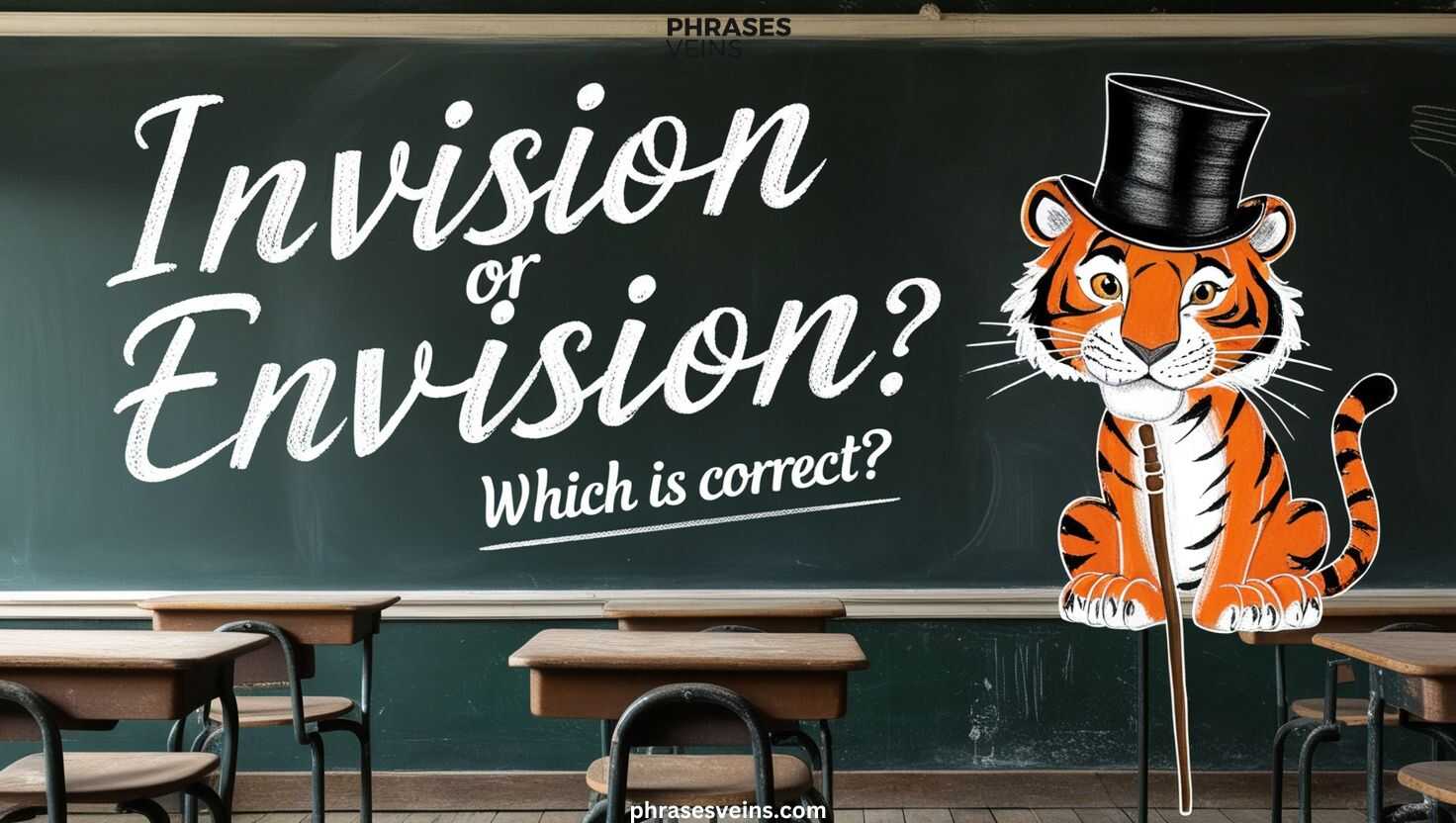The confusion between Invision vs Envision is common. Both words look and sound similar, but one is correct and the other is a common misspelling. Let’s clear up this confusion once and for all! This guide will explore the correct spelling, the meaning of Envision, its historical roots, and much more. By the end, you’ll have a clear understanding of which word to use and why Invision is not the right term.
Understanding the Common Confusion Between envision vs invision
The main reason people confuse Invision with Envision is because of phonetic similarity. The words sound the same when spoken, but they are spelled differently. In addition, the visual similarity of the two words makes it easy to make this mistake while writing. The spelling “Invision” is also found in brand names, like “InVision,” which could add to the confusion.
Many people may also encounter this error because of common mistakes in typing or autocorrect. These errors happen all the time when we’re typing quickly on a phone or computer. Unfortunately, even though Invision appears as a suggestion, it’s not correct in this context.
Quick Comparison of “invision vs envision”
The difference between Invision and Envision comes down to one letter. “Envision” is the proper spelling, while “Invision” is a typographical mistake that many people make. It’s easy to confuse them because both words sound the same, but the correct spelling is Envision.
Here’s a quick comparison:
| Term | Correct Spelling | Meaning |
|---|---|---|
| Invision | No | Incorrect spelling |
| Envision | Yes | To imagine something mentally, to visualize it |
The Origin and Evolution of the Word “Envision”
Envision has its roots in the Latin word “invidere,” meaning to look at or observe something. Over time, it evolved to mean the act of forming a mental image or a concept of something. As language evolved, Envision became the standard term in English.
Historical Roots
The historical linguistics behind the word shows that it was used as early as the 16th century. Originally, the word focused more on the visualization of objects and concepts in one’s mind. This idea of imagining or picturing something in your mind continued to evolve, and by the 19th century, it began to be used more frequently in writing and spoken language.
Development Over Time
As the language developed, the spelling Envision became the standard usage. However, variations like “Invision” occasionally appeared in informal writing. This was primarily due to spelling changes and regional language trends that influenced how the word was written.
From Old Spellings to Modern Usage
Language changes over time, and so does the way we spell words. The correct spelling of Envision was not always as consistent as it is today. Before standardization, many English words had multiple spellings. Over time, dictionaries and grammar rules helped set a standard, and Envision became the officially accepted spelling.
Historical Spellings
In older texts, you might find the word spelled as “Invision” or “Inviser” in some cases. However, the modern usage has settled on Envision. As English continues to evolve, these old spellings are now considered incorrect.
Standardization
As spelling became more standardized in the 19th century, English dictionaries played a huge role in promoting the correct form of words. This helped eliminate many of the earlier variations and led to the widespread acceptance of Envision.
READ MORE >>> What Does “WSP” Mean in Text? Decoding the Slang Term
Expanding Your Vocabulary: Synonyms and Usage of Envision
If you’re looking to expand your vocabulary, consider using synonyms of Envision. Words like visualize, imagine, and picture carry similar meanings.
Synonyms for Envision
- Visualize: To form a mental image of something.
- Imagine: To think about something that may not be real.
- Picture: To mentally form an image of something.
These words are often interchangeable, but Envision is more specific when referring to the act of forming a clear mental image of something.
Usage Examples
- “She envisioned a bright future for herself.”
- “He could not imagine what life would be like in a new city.”
- “Can you picture the scene in your mind?”
How Language Evolution Affects Spelling
Language evolution affects spelling in various ways. For example, as regional differences in language grew, the need for spelling standardization became more evident. When people from different parts of the world read and write, they need a unified way to spell words for clear communication.
Language Evolution
Language changes over time, and this includes how we spell words. As English speakers spread across the world, spelling variations developed. For example, American and British English often have different spelling rules, but both agree on Envision as the correct spelling.
Impact on Usage
Language changes don’t only affect spelling. They also influence the usage of words. While Envision is the proper term, Invision is often mistakenly used in informal contexts, especially online. This is a clear example of how language trends and modern usage affect everyday communication.
Correct Usage of Envision in American and British English
While Envision is the correct spelling in both American and British English, there are subtle differences in how it’s used.
American English
In American English, Envision is used to describe the act of imagining or forming a mental picture of something. It’s common in both formal and informal contexts, such as business or creative writing.
British English
In British English, Envision is used in much the same way. However, the term visualize might be more common in some areas of the UK.
Envision vs Invision: Clarity on Proper Spelling
To sum it up, Envision is always the correct spelling. There’s no reason to use Invision unless you are referring to a brand name or a typo. Knowing the difference between the two is essential for writing clarity.
Comparison
| Term | Correct Usage | Meaning |
|---|---|---|
| Envision | Correct | To imagine or picture something mentally |
| Invision | Incorrect | Common misspelling of “Envision” |
Why the Confusion
The confusion between Invision and Envision often arises from phonetic confusion. Since they sound the same when spoken, people sometimes think both spellings are acceptable. The visual appearance of the words also doesn’t help, as the “I” and “E” look very similar.
Why Invision Is a Persistent Misspelling
The persistence of Invision as a misspelling can be attributed to the similarity in pronunciation, especially in casual speech. Visual similarity and typographical mistakes also play a large role in why people keep using it incorrectly. The rise of auto-correction tools in text apps has made this issue worse, as “Invision” is often suggested instead of “Envision.”
Visual Similarity
The visual similarity between “Invision” and “Envision” is hard to ignore. The two words have almost identical letters except for the “I” and “E.” This visual similarity makes it easy to confuse the two while typing.
Phonetic Confusion
Another reason for the confusion is phonetic similarity. Both words are pronounced the same way, making it harder to distinguish between them when writing. It’s only through understanding the correct spelling that people can avoid making this mistake.
Influence of Technology
The rise of autocorrect features in smartphones and computers has made it easier to confuse Invision with Envision. Many typing apps suggest “Invision” as a valid alternative, leading to frequent errors. This technology influence can distort our understanding of proper spelling.
Frequently Asked Questions
What is the difference between Invision and Envision?
The main difference is that “envision” is the correct spelling, while “invision” is a common misspelling. “Envision” means to imagine or visualize something in your mind, especially something that hasn’t happened yet. “Invision,” on the other hand, is not a standard word in English and is considered a typographical error.
What does it mean to envision something?
To envision something means to form a mental image or concept of it. It’s the act of imagining or visualizing something, often a future event or situation. For example, when you envision your dream house, you imagine its appearance, layout, and the feelings it gives you, even though it may not exist yet.
What is the meaning of Invision?
“Invision” does not have a meaning in standard English. It is a misspelling of the word “envision.” If you encounter “invision” in writing, it’s likely a typo or error.
How do you use Envision?
You can use “envision” when talking about imagining or visualizing something, typically a future event or an idea. For example:
- “She envisions a world where people live in harmony.”
- “I envision myself as a successful entrepreneur in five years.”
In both cases, “envision” is used to describe the act of imagining something yet to come.
How do I envision my life?
To envision your life, you can picture the kind of future you want. Think about your goals, dreams, and desires. Imagine where you want to be in five or ten years, what you want to accomplish, and the experiences you want to have. Visualization can be a powerful tool to help guide your decisions and actions toward achieving those dreams.
What is envision used for?
Envision is used to express the act of imagining or visualizing something, usually a future event, idea, or scenario. It’s often used in goal-setting, creative processes, or when discussing possibilities. For example, an artist may envision a painting before creating it, or a business leader may envision the future of their company.
Conclusion
Now you know the correct spelling of the word: Envision. Remember, it’s always important to use the right word for clear communication. Avoid the common mistake of using Invision and ensure your writing is accurate. Use grammar tips and spelling rules to avoid errors and improve your English writing skills. Keep practicing, and you’ll write like a pro!

Welcome to PhrasesVeins, where Arabella Reed brings language to life. With a passion for grammar and phrases, Arabella offers unique insights to help you master language and enhance your expression. Whether you’re a language enthusiast or looking to improve your skills, Arabella’s work guides you through the beauty of words.

